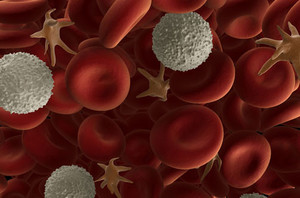The European Medicines Agency (EMA) has granted marketing authorization for a new long-acting filgrastim – Lonquex (XM22 lipegfilgrastim) – to prevent chemotherapy-induced neutropenia in cancer patients.
EMA approval for Teva’s long-acting recombinant G-CSF
Biosimilars/News
|
Posted 23/08/2013
 0
Post your comment
0
Post your comment

The recombinant granulocyte colony-stimulating factor (G-CSF), which includes the active ingredient lipegfilgrastim, was developed by Israel-based generic drugmaker Teva Pharmaceutical Industries (Teva), and was authorized eight weeks after receiving a positive opinion from EMA’s Committee for Medicinal Products for Human Use (CHMP).
Because it is ‘glycopegylated’ (rather than peglylated) polymer chains are added to the active protein that are distant from the active site. In theory, this should prevent variations in the activity of the drug molecule and increase its structural homogeneity.
Last year, FDA granted approval for Teva’s tbo-filgrastim (XM02 filgrastim), the first new G-CSF to be approved in the US in more than 10 years [1].
The marketing authorization of Lonquex (lipegfilgrastim) provides clinicians with another long-acting G-CSF treatment choice when managing the effects of chemotherapy-induced neutropenia (CIN) in patients with cancer in Europe. CIN is a potentially life-threatening side effect of cancer chemotherapy, caused by a drop in neutrophil numbers and corresponding susceptibility to bacterial infections.
Guidelines from the European Organisation for Research and Treatment of Cancer (EORTC) recommend prophylactic G-CSF treatment for chemotherapy patients with an overall high risk (≥ 20%) of developing febrile neutropenia to help avoid the risks associated with a low neutrophil count [2].
Lonquex will compete in the marketplace with Neulasta (pegfilgrastim, Amgen) and will be dosed in the same way as a single subcutaneous injection once per chemotherapy cycle. Lonquex was shown to be non-inferior to Neulasta in trials, although there was no evidence of advantages over the Amgen drug.
Teva markets another biosimilar version of Neupogen (filgrastim) in Europe, together with Sandoz and Hospira, but this latest approval of the new drug Lonquex provides Teva with a significant advantage over its competitors.
Related article
Biosimilar G-CSF prescribed more than originator
References
1. GaBI Online - Generics and Biosimilars Initiative. Teva receives FDA approval for filgrastim in the US [www.gabionline.net]. Mol, Belgium: Pro Pharma Communications International; [cited 2013 Aug 23]. Available from: www.gabionline.net/Biosimilars/News/Teva-receives-FDA-approval-for-filgrastim-in-the-US
2 Aapro MS, Bohlius J, Cameron DA, et al. 2010 update of EORTC guidelines for the use of granulocyte-colony stimulating factor to reduce the incidence of chemotherapy-induced febrile neutropenia in adult patients with lymphoproliferative disorders and solid tumours. Eur J Cancer. 2011;47(1):8-32.
Permission granted to reproduce for personal and non-commercial use only. All other reproduction, copy or reprinting of all or part of any ‘Content’ found on this website is strictly prohibited without the prior consent of the publisher. Contact the publisher to obtain permission before redistributing.
Copyright – Unless otherwise stated all contents of this website are © 2013 Pro Pharma Communications International. All Rights Reserved.
Source: EMA, Teva
Research
Reaching ESG goals in pharmaceutical development
What is the future for the US biosimilar interchangeability designation
General
Samsung Bioepis wins Pyzchiva case; Regeneron patent rulings threaten foreign biosimilars
Chinese biosimilars go global: growth, partnerships, and challenges
Most viewed articles
The best selling biotechnology drugs of 2008: the next biosimilars targets
Global biosimilars guideline development – EGA’s perspective
Related content
FDA approves Poherdy (first interchangeable pertuzumab) and Armlupeg (pegfilgrastim) biosimilars
EMA recommends approval for insulin glargine biosimilar Ondibta and denosumab biosimilar Osqay
FDA approves denosumab biosimilars Osvyrti and Jubereq, Boncresa and Oziltus
FDA approves aflibercept biosimilar Eydenzelt and label expansion for adalimumab biosimilar Yuflyma
FDA approves Poherdy (first interchangeable pertuzumab) and Armlupeg (pegfilgrastim) biosimilars

Biosimilars/News Posted 27/01/2026
EMA recommends approval for insulin glargine biosimilar Ondibta and denosumab biosimilar Osqay

Biosimilars/News Posted 16/01/2026
FDA approves denosumab biosimilars Osvyrti and Jubereq, Boncresa and Oziltus

Biosimilars/News Posted 07/01/2026
FDA approves aflibercept biosimilar Eydenzelt and label expansion for adalimumab biosimilar Yuflyma

Biosimilars/News Posted 05/12/2025
The best selling biotechnology drugs of 2008: the next biosimilars targets






Post your comment